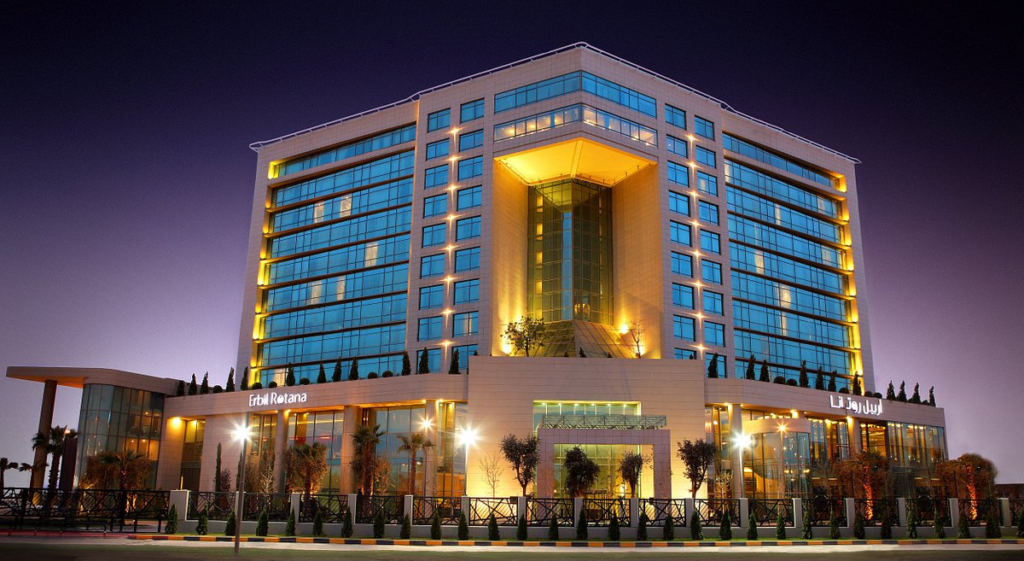The best seven-7 luxury tourist hotels in Iraq

you with information on some luxury hotels in Iraq. However, please note that the situation may have changed since then, and it’s always a good idea to verify the latest information before making any travel plans. Here are seven luxury hotels in Iraq that were highly regarded at the time:
- Babylon Warwick Hotel (Baghdad): Located in the capital city, this five-star hotel offers luxurious accommodations, fine dining options, a spa, and extensive conference facilities.
- Coral Beach Hotel & Resort (Baghdad): Situated on the banks of the Tigris River, this hotel provides a range of upscale amenities, including spacious rooms, multiple restaurants, a swimming pool, and a fitness center.
- Sheraton Grand Baghdad Hotel: Offering panoramic views of the city, this hotel features elegant rooms, an outdoor pool, a fitness center, and various dining options.
- Erbil Rotana Hotel (Erbil): Situated in the Kurdistan region, this five-star hotel boasts stylish rooms, a range of restaurants, a spa, a fitness center, and an outdoor pool.
- Divan Erbil Hotel (Erbil): Known for its contemporary design, this luxury hotel offers well-appointed rooms, several dining options, a spa, and a fitness center.
- Dedeman Hotel (Erbil): Another prominent hotel in Erbil, Dedeman provides upscale accommodations, multiple dining choices, a fitness center, and a rooftop swimming pool with stunning city views.
- Grand Millennium Sulaimani (Sulaymaniyah): Located in the city of Sulaymaniyah, this five-star hotel offers luxurious rooms and suites, various dining options, a spa, and a rooftop swimming pool.
Remember to check for the latest information, reviews, and availability before finalizing any hotel bookings.

Certainly! Iraq is a country rich in history and culture, and there are several tourist attractions and landmarks located near the luxury hotels I mentioned earlier. Here are some notable sites you may want to explore:
- Babylon Archaeological Site (near Babylon Warwick Hotel, Baghdad): Explore the ancient ruins of the city of Babylon, including the iconic Ishtar Gate, the Hanging Gardens (one of the Seven Wonders of the Ancient World), and the ruins of the Babylonian palaces.
- National Museum of Iraq (near Babylon Warwick Hotel, Baghdad): Discover a vast collection of artifacts that showcase Iraq’s rich heritage, including ancient Mesopotamian artifacts, Assyrian reliefs, and Islamic art.
- Baghdadi Museum (near Coral Beach Hotel & Resort, Baghdad): This museum houses a collection of artifacts, manuscripts, and historical objects that highlight Iraq’s cultural and artistic heritage.
- Erbil Citadel (near Erbil Rotana Hotel and Divan Erbil Hotel, Erbil): Explore the ancient citadel, a UNESCO World Heritage Site, and wander through its narrow streets, visit the historical landmarks, and enjoy panoramic views of the city.
- Sami Abdul Rahman Park (near Dedeman Hotel, Erbil): This large park offers beautiful green spaces, walking paths, playgrounds, and a lake where visitors can relax and enjoy the outdoors.
- Sulaymaniyah Museum (near Grand Millennium Sulaimani, Sulaymaniyah): Discover the history and culture of the Kurdish region at this museum, which houses a collection of artifacts, including ancient pottery, jewelry, and manuscripts.
- Amna Suraka Museum (near Grand Millennium Sulaimani, Sulaymaniyah): Located in the former headquarters of Saddam Hussein’s secret police, this museum provides insights into the dark history of the Kurdish people and the Ba’ath regime.
Please note that these attractions are based on information available up until September 2021, so it’s important to check for any updates or changes in accessibility before visiting.

Yes, guided tours are available for many of the attractions and landmarks in Iraq. While the availability and specifics of guided tours may vary, especially considering the dynamic nature of the tourism industry, it is common to find tour operators and local guides who can provide informative and organized tours. These tours can enhance your experience by offering historical context, cultural insights, and a deeper understanding of the sites you visit.
It is advisable to inquire with your hotel concierge or do some research online to find reputable tour operators or guides who specialize in the specific regions or attractions you wish to visit. They can provide you with tailored itineraries, transportation, and knowledgeable guides who can accompany you to the sites of interest.
Additionally, some hotels themselves may offer guided tours or have partnerships with local tour companies, so it’s worth inquiring about tour options when you book your stay.
Remember to consider the current situation and security conditions in Iraq, and consult updated travel advisories from your country’s foreign affairs department or embassy before making any travel arrangements.

While I don’t have access to real-time information or specific recommendations for tour operators in Iraq, I can provide you with some general tips to help you find reputable operators. When searching for tour operators in Iraq, consider the following:
- Research online: Look for tour operators that specialize in Iraq or the specific regions you plan to visit. Check their websites, read reviews from previous customers, and see if they have any certifications or affiliations that indicate their professionalism and adherence to industry standards.
- Seek recommendations: Ask for recommendations from fellow travelers who have visited Iraq recently or consult online travel forums and communities for insights from people who have firsthand experience with particular tour operators.
- Contact local tourism organizations: Get in touch with local tourism organizations or visitor centers in the regions you plan to visit. They can often provide information on accredited tour operators or may even have their own recommended list of operators.
- Consult with your hotel: Speak to the concierge or staff at your hotel in Iraq. They are likely to have knowledge of reliable tour operators and can provide recommendations based on their local expertise.
- Check for licenses and permits: Ensure that the tour operator you choose holds the necessary licenses and permits required to operate legally in Iraq. This can help ensure that they meet certain standards and regulations.
- Customize your tour: If you have specific interests or preferences, consider working with a tour operator who can create a customized itinerary tailored to your needs. This allows for a more personalized experience.
Remember to exercise caution and conduct thorough research when selecting a tour operator. Stay updated on travel advisories and follow any safety recommendations provided by your government or relevant authorities.

Reputable tour operators in Iraq may have certifications or affiliations that demonstrate their professionalism and commitment to quality service. While specific certifications and affiliations can vary, here are some common ones you may come across:
- Iraqi Ministry of Tourism and Antiquities: Tour operators in Iraq may be registered and licensed by the Iraqi Ministry of Tourism and Antiquities. This official recognition indicates that they meet the country’s requirements and regulations for operating as a tour operator.
- International Air Transport Association (IATA): If the tour operator also handles flight arrangements as part of their services, they may be affiliated with IATA. This association ensures that the operator follows industry standards and practices related to air travel.
- International Tour Operator Associations: Reputable tour operators may be members of international associations such as the United States Tour Operators Association (USTOA), European Tour Operators Association (ETOA), or the World Tourism Organization (UNWTO). Membership in these organizations often signifies adherence to certain professional standards and ethical practices.
- Local and Regional Associations: Tour operators in Iraq may be affiliated with local or regional tourism associations that promote responsible tourism and uphold industry standards. For example, the Iraqi Tourism Board or Kurdistan Tourism Board may have their own accreditation or affiliation programs.
- TripAdvisor or Travel Association Ratings: Check if the tour operator has positive reviews and ratings on reputable travel websites like TripAdvisor. Although not a certification, high ratings and positive feedback from past customers can be a good indication of a reliable operator.
Remember that certifications and affiliations are not the sole determinants of a reputable tour operator. It’s essential to consider multiple factors, such as customer reviews, experience, and the operator’s knowledge of the region and its attractions. Conduct thorough research and choose a tour operator that aligns with your preferences and travel needs.

While I can provide general information about the requirements and regulations for tour operators in Iraq, it’s important to note that specific details may have changed since my knowledge cutoff in September 2021. For the most accurate and up-to-date information, I recommend contacting the Iraqi Ministry of Tourism and Antiquities directly or referring to their official website.
The Iraqi Ministry of Tourism and Antiquities is responsible for overseeing and regulating tourism activities in Iraq. Some of the requirements and regulations they may have in place for tour operators include:
- Licensing: Tour operators in Iraq are typically required to obtain a license from the Ministry of Tourism and Antiquities. This license ensures that the operator meets certain criteria and standards set by the ministry.
- Professionalism and Training: The ministry may require tour operators to demonstrate a certain level of professionalism and competence. This may involve having qualified guides who are knowledgeable about the country’s history, culture, and attractions.
- Compliance with Safety Standards: Tour operators must comply with safety standards to ensure the well-being of their clients. This may include adhering to transportation safety regulations, providing appropriate insurance coverage, and implementing emergency protocols.
- Preservation of Antiquities: Given Iraq’s rich historical heritage, tour operators are expected to abide by regulations related to the preservation and protection of antiquities. They should respect archaeological sites, follow guidelines for visiting historical sites, and promote responsible tourism practices.
- Compliance with Tourism Laws: Tour operators need to comply with the applicable tourism laws and regulations of Iraq. This may include restrictions on certain activities, adherence to operating hours and rules at tourist sites, and compliance with any specific guidelines or permits required for operating in certain regions.
It’s worth noting that the specific requirements and regulations may vary depending on the type of tour operator, the services they offer, and the regions they operate in. It is advisable for tour operators to maintain regular communication with the Iraqi Ministry of Tourism and Antiquities to stay updated on any changes to regulations or requirements.
To obtain detailed and current information, I recommend reaching out to the Iraqi Ministry of Tourism and Antiquities directly or visiting their official website for the most accurate and up-to-date information on the requirements and regulations for tour operators in Iraq.



